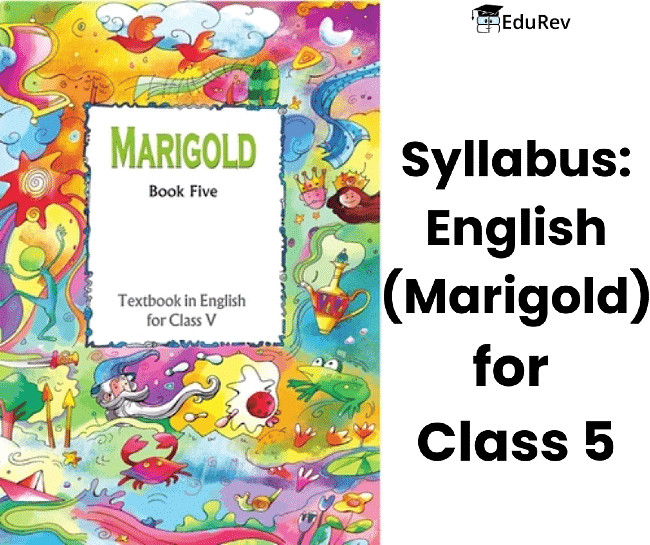Syllabus: English (Marigold) for Class 5 | English Marigold Class 5 PDF Download
It's crucial to understand the Class 5 English syllabus as it helps in developing communication skills—listening, speaking, reading, and writing. English is vital in a diverse country like India, making it easier to learn than multiple languages. Proficiency in English aids in university admissions, job opportunities, and global communication. Mastering the language is essential for academic tasks, travel, and professional engagements, ensuring you feel confident and capable in various situations. So, grasp the Class 5 English syllabus to enhance your language skills early on.

Class 5 English Merigold Syllabus
Unit 1
Poem 1: Ice-cream Man
- Introduction to the story of Avial, a famous dish from Kerala.
- Exploration of creative use of waste materials to make wonderful things.
Chapter 1: Wonderful Waste!
- Description of the joy and happiness brought by the ice cream man.
- Reflection on the role of the ice cream man during hot summer days.
Unit 2
Poem 2: Teamwork
- Understanding the effectiveness of teamwork through a basketball game.
- Learning the moral lessons conveyed through collaborative efforts.
Chapter 2: Flying Together
- Lesson on teamwork and collaboration illustrated by a flock of geese.
- Emphasis on the importance of unity in overcoming challenges.
Unit 3
Poem 3: My Shadow
- Poem narrated from a child's perspective finding joy in their own shadow.
- Reflection on the curiosity and innocence of a child regarding their shadow.
Chapter 3: Robinson Crusoe Discovers a Footprint
- Story of Robinson Crusoe discovering a footprint on an isolated island.
- Exploration of his initial happiness and later fear of being alone.
Unit 4
Poem: Crying
- Poetic encouragement for expressing emotions through crying.
- Understanding the therapeutic aspect of crying to relieve sadness.
Chapter: My Elder Brother
- Tale of two brothers with differing opinions and personalities.
- Emphasis on respecting elders and understanding generational differences.
Unit 5
Chapter: The Lazy Frog (Old NCERT)
- A humorous poem teaching the drawbacks of laziness.
Chapter: Rip Van Winkle
- Story of a Dutch-American man and the changes in his life after meeting dwarfs.
- Based on a German folktale with themes of transformation.
Unit 6
Poem: Class Discussion
- The message is that individuals are unique and not everyone in the world is the same.
- Encouraging acceptance and understanding of diverse perspectives.
Chapter 6: The Talkative Barber
- Narrative about a talkative barber, conveying the downside of excessive talking.
- Teaching the students the importance of moderation in communication.
Unit 7
Poem: Topsy-turvy Land
- Description of a peculiar land where everything is upside down.
- Exploration of the whimsical elements in a topsy-turvy world.
Chapter: Gulliver’s Travels
- Adventure story of Lemuel Gulliver and his experiences in the land of Lilliputians.
- Introduction to the imaginative and fantastical world of Gulliver's travels.
Unit 8
Poem: Nobody’s Friend
- Poetic exploration of making friends through sharing.
- Emphasis on the negative aspect of selfishness in fostering friendships.
Chapter: The Little Bully
- Story about a little boy who teases others, making him unpopular.
- Conveying the message about the consequences of bullying and the importance of kindness.
Unit 9
Poem: Sing a Song of People
- Reflection on the fast-paced nature of today's world.
- Poetic urging to take a break and live in the present moment.
- Illustration of determination and passion in pursuing one's goals.
Unit 10
Poem: Malu Bhalu
- Life story of Malu Bhalu, illustrating how parents help in facing life's challenges.
- Emphasis on the role of parental guidance in learning and overcoming difficulties.
Chapter: Who Will Be Ningthou?
- Discussion on the characteristics a king must possess.
- Introduction to the qualities expected in a leader or king.
English Grammar and Writing Syllabus
- Unseen Passage
- Essay Writing
- Letter Writing
- Story Writing
- The Sentence
- The Noun & Its Kinds
- Pronoun And Its Kinds
- Verb And Tense
- Adjectives
- Adverbs
- Prepositions
- Conjunctions
- Irregular Plurals
- Articles
- Quantifiers
- Determiners
- Modals
- Subject & Predicate
- Subject Verb Agreement
- Phrases
- Contractions
- Punctuation
- Comprehension
- Picture Description
- Composition
- Dairy Entry
- Notice Writing
- Dialogue Writing
- Synonyms and Antonyms
We hope you have found this information helpful for studies. You can also check out some extra courses on the EduRev app, like:
Explore all courses of class 5 from this link.
|
22 videos|156 docs|67 tests
|
FAQs on Syllabus: English (Marigold) for Class 5 - English Marigold Class 5
| 1. What are the main themes covered in the Marigold English textbook for Class 5? |  |
| 2. How can students improve their vocabulary using the Marigold textbook? |  |
| 3. What types of exercises are included in the Marigold English syllabus for Class 5? |  |
| 4. How does the Marigold textbook encourage creativity in students? |  |
| 5. What are some effective study tips for students using the Marigold textbook? |  |




















